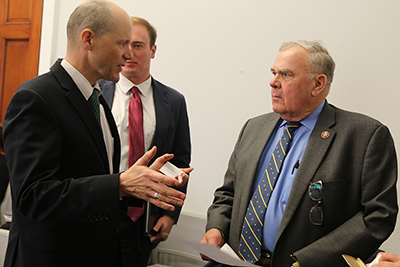
At a briefing on Capitol Hill last week hosted by the bipartisan Congressional Cooperative Business Caucus, NCBA CLUSA highlighted the need for a policy environment that enables co-op development and, ultimately, advances a more inclusive economy.
Co-chaired by Reps. Jim Baird (R-IN) and Mark Pocan (D-WI) and now totaling 20 members, the caucus is critical to ensuring that federal lawmakers keep co-op priorities top of mind when crafting and considering legislation. The caucus is also a platform to educate Congressional staff—a number of whom attended last week’s briefing—on cooperative issues.
In an introduction of the economic and societal impacts of the nation’s 65,000 co-op establishments, NCBA CLUSA president and CEO noted that no cooperative sector in the U.S. has gone to scale without an enabling policy environment—“that means technical assistance, access to capital and a tax structure that makes sense,” he said.
“So it’s really critical to have leadership like Congressmen Baird and Pocan and others.”
Joining O’Brien and the co-chairs for the briefing were representatives from the nation’s rural electric, farm credit and worker cooperatives. The first two sectors represent co-op success stories in the U.S.
Brian Cavey, Senior Vice President of Government Affairs at CoBank, spoke about the nation’s $350 billion farm credit network, which lends to almost 19,000 customers nationwide that range from mid-size farms to household brands like Land O’Lakes and Ocean Spray. CoBank is one of four banks in the farm credit system.
In 2018, CoBank returned $700 million back into rural communities in patronage dividends, Cavey said. “It’s a different business model, and I think it’s a better business model.”
The legacy and potential of rural electric cooperatives is similar. America’s electric co-ops keep the lights on in 56 percent of the nation; power 19 million homes, businesses and schools across 48 states; and contributed $440 billion to the economy between 2013 and 2017.
“We’re the economic cornerstones of our communities,” said John Cassady, Vice President of Legislative Affairs for the National Rural Electric Cooperative Association. And with their expertise in infrastructure development and deployment, rural electric co-ops are poised—once again—to transform life in rural America by bringing broadband to the estimated 24 million American households who remain disconnected from 21st century economic opportunities, Rep. Baird said.
“When we think about today, we have to consider what people need to participate in their local, national and international economies,” O’Brien said. “It’s certainly broadband. But it’s also a solution to a time of real flux in the workplace.”
America’s worker cooperatives represent an emerging opportunity for co-op developers and policymakers alike. In fact, worker co-ops are the fastest-growing sector in the country, said Mo Manklang, Communication Director and Policy Lead for the U.S. Federation of Worker Cooperatives. In the past 15 years, the number of worker co-ops has tripled; the sector now counts an estimated 600-700 establishments.
But, if the sector is able to achieve parity with other small businesses in access to finance from the Small Business Administration (SBA), that number could “easily jump to 6,000 or 7,000,” Manklang said. While the Main Street Employee Ownership Act in theory evened access to SBA financing, the SBA has yet to identify a feasible path forward, falling back on its personal guarantee requirement.
“That’s not how a worker co-op works. Worker co-ops build in dedication to and ownership of the business, and that’s what make them stable,” she said.
And that stability is critical as small businesses—what Manklang called the “backbone of America”—face big box buyout or closure as their baby boomer owners near retirement. Worker co-op conversions are a viable succession plan that “keep jobs in the hands of experts, and keep businesses anchored within the communities they already serve,” she said.
Since the passage of the Main Street Employee Ownership Act in 2018, the idea of worker co-op conversions has continued to gain traction among policymakers. A key way elected officials can show their support is by joining the Congressional Cooperative Business Caucus, Rep. Pocan said.
“When people who have common interests work together, when there’s legislation that’s introduced or an opportunity to do so, we can have a real impact,” he said.


